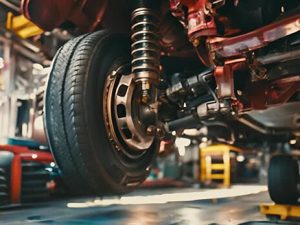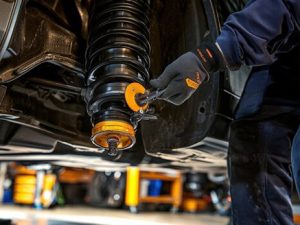When thinking about ways to improve your car’s fuel efficiency, many drivers immediately think of maintaining proper tire pressure, choosing the right fuel, or even opting for lighter materials. However, one often-overlooked aspect of vehicle performance that can influence your fuel economy is the condition of your shock absorbers. Believe it or not, worn-out or improperly functioning shock absorbers can negatively impact how efficiently your vehicle uses fuel. In this article, we’ll explore the connection between shock absorbers and fuel efficiency, and how maintaining these crucial components can save you money at the pump.
How Shock Absorbers Influence Ride Quality and Efficiency

The primary function of shock absorbers is to control the movement of your vehicle’s suspension, ensuring that your tires maintain consistent contact with the road. When shock absorbers are in good condition, they smooth out bumps, dips, and other imperfections in the road surface, providing a comfortable and stable ride. However, when they are worn or damaged, the vehicle may bounce excessively or sway, causing the tires to lose contact with the road intermittently.
This loss of traction can cause increased rolling resistance, meaning that your engine has to work harder to keep the vehicle moving. The harder your engine works, the more fuel it uses, leading to reduced fuel efficiency. So, when shock absorbers are not performing optimally, your car’s fuel economy can suffer due to increased energy demands.
Increased Rolling Resistance and Reduced Tire Contact
Rolling resistance is the force that resists the motion of your tires as they roll across the ground. A significant contributor to rolling resistance is the quality of the tire-to-road contact, which is directly affected by the suspension system, including shock absorbers.
When shock absorbers are worn out or inefficient, the suspension may allow the tires to bounce or tilt too much. This can cause uneven tire wear and reduce the overall effectiveness of your tires in maintaining consistent contact with the road. As a result, the engine has to work harder to compensate for the reduced grip, thus using more fuel. A well-maintained suspension with functional shock absorbers ensures better tire contact, reducing rolling resistance and improving fuel efficiency.
Impact on Aerodynamics and Stability
Shock absorbers also play a role in the overall stability and aerodynamics of your vehicle. Worn shock absorbers can lead to excessive body roll, which affects the car’s aerodynamics. When the body of the car shifts too much from side to side, or when the vehicle dips and bounces excessively, it can create more drag, which increases fuel consumption.
By ensuring that your shock absorbers are in good condition, you help the car maintain a stable and balanced profile, reducing unnecessary drag and improving fuel efficiency. In addition, a stable vehicle is less likely to experience sudden shifts in speed or direction, leading to smoother acceleration and deceleration, both of which can save fuel.
The Link Between Suspension Alignment and Fuel Economy

A well-aligned suspension system is essential for optimal fuel efficiency. Worn-out or faulty shock absorbers can throw off your vehicle’s alignment, causing the tires to wear unevenly and the vehicle to pull to one side. Misalignment increases friction between the tires and the road, leading to more rolling resistance and, as a result, greater fuel consumption.
Keeping your shock absorbers in good condition helps maintain the alignment of your suspension, which in turn helps your vehicle run more efficiently and conserve fuel. Regular suspension checks, including inspecting your shock absorbers, can help you avoid the additional fuel costs associated with poor alignment.
How to Maintain Your Shock Absorbers for Optimal Fuel Efficiency
To ensure that your shock absorbers are not negatively impacting your car’s fuel economy, it’s important to perform regular checks and maintenance. Here are a few tips for keeping your shock absorbers in peak condition:
- Monitor for signs of wear: Keep an eye out for signs that your shock absorbers might be failing, such as excessive bouncing, clunking noises, or uneven tire wear.
- Inspect regularly: Make it a habit to inspect your shock absorbers during routine maintenance intervals, such as when you rotate your tires or change the oil.
- Check alignment: If you notice that your vehicle is pulling to one side or the steering feels off, have your suspension alignment checked. Misalignment caused by worn shock absorbers can affect both your handling and fuel efficiency.
- Replace when necessary: If your shock absorbers are damaged or have reached the end of their lifespan, it’s important to replace them promptly. Waiting too long can lead to further suspension issues and decreased fuel efficiency.
The Long-Term Savings of Maintaining Shock Absorbers
Although replacing shock absorbers may seem like an added cost, the long-term savings in fuel efficiency can offset the expense. A well-maintained suspension system ensures that your vehicle operates smoothly, reducing strain on the engine and improving fuel economy. Over time, the money you save on fuel can more than cover the cost of shock absorber replacement.
In addition to fuel savings, maintaining your shock absorbers helps extend the lifespan of your tires, suspension components, and even your brake system, all of which contribute to reducing overall vehicle maintenance costs.
Conclusion
Shock absorbers play a vital role in your vehicle’s suspension system, and their performance has a direct impact on fuel efficiency. Worn-out shock absorbers can lead to increased rolling resistance, reduced tire contact, poor aerodynamics, and misalignment, all of which can negatively affect your car’s fuel consumption. By regularly maintaining and replacing your shock absorbers as needed, you can keep your vehicle running smoothly, improve fuel economy, and enjoy long-term savings. Don’t overlook this essential component of your car’s performance – keeping your shock absorbers in top shape is a simple yet effective way to reduce fuel costs and ensure a safer, more efficient driving experience.